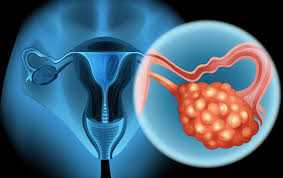
In an alarming development for women’s health, ovarian cancer cases among young women are on the rise in Kashmir, according to Dr. Shamima Wani, Professor and Head of the Department of Oncology at GMC Srinagar.
Dr. Shamima explained that ovarian cancer begins when small cysts form in one or both ovaries and later become cancerous. However, not all ovarian cysts are cancerous. “Ovarian cancer results from the uncontrolled division of ovarian cells, which can spread to surrounding tissues if left untreated. The three main types are epithelial ovarian cancer, germ cell tumors, and stromal cell tumors,” she said.
Highlighting a worrying trend, Dr. Shamima noted that ovarian cancer is becoming more common than breast cancer among women in the region. “70 percent of cancer patients admitted to our oncology department are affected by ovarian cancer,” she reported.
Traditionally seen in women above 50, the cancer is now increasingly affecting those in their 30s and 40s. Epithelial ovarian cancer, once associated with older women, is no longer age-specific.
Dr. Shamima pointed to several contributing factors: late marriage, obesity, delayed or no childbearing, dietary and lifestyle changes, and the use of certain hormonal medications. “Continuous egg formation in the ovaries without interruption can also elevate cancer risk,” she added.
For younger and unmarried women, she noted that lifestyle changes and exposure to pesticides in fruits and vegetables might be contributing to the trend.
Most cases, about 80 percent, are detected at stage three—when full recovery is more challenging. Only 20 percent are diagnosed at earlier stages. “Complete treatment is only possible in stage one and two. At stage three, 70 percent of patients can be treated, but recurrence is possible,” Dr. Shamima said.
She emphasized the increasing incidence of gynecological cancers in the Kashmir Valley compared to other parts of India. “Alongside breast cancer, ovarian cancer cases are rising rapidly here, especially among young women,” she warned.
Ovaries, the reproductive glands in women, play a crucial role in egg production and hormone regulation. The increasing threat to this vital organ calls for greater awareness, early detection, and lifestyle interventions to curb the growing health crisis.
In an alarming development for women’s health, ovarian cancer cases among young women are on the rise in Kashmir, according to Dr. Shamima Wani, Professor and Head of the Department of Oncology at GMC Srinagar.
Dr. Shamima explained that ovarian cancer begins when small cysts form in one or both ovaries and later become cancerous. However, not all ovarian cysts are cancerous. “Ovarian cancer results from the uncontrolled division of ovarian cells, which can spread to surrounding tissues if left untreated. The three main types are epithelial ovarian cancer, germ cell tumors, and stromal cell tumors,” she said.
Highlighting a worrying trend, Dr. Shamima noted that ovarian cancer is becoming more common than breast cancer among women in the region. “70 percent of cancer patients admitted to our oncology department are affected by ovarian cancer,” she reported.
Traditionally seen in women above 50, the cancer is now increasingly affecting those in their 30s and 40s. Epithelial ovarian cancer, once associated with older women, is no longer age-specific.
Dr. Shamima pointed to several contributing factors: late marriage, obesity, delayed or no childbearing, dietary and lifestyle changes, and the use of certain hormonal medications. “Continuous egg formation in the ovaries without interruption can also elevate cancer risk,” she added.
For younger and unmarried women, she noted that lifestyle changes and exposure to pesticides in fruits and vegetables might be contributing to the trend.
Most cases, about 80 percent, are detected at stage three—when full recovery is more challenging. Only 20 percent are diagnosed at earlier stages. “Complete treatment is only possible in stage one and two. At stage three, 70 percent of patients can be treated, but recurrence is possible,” Dr. Shamima said.
She emphasized the increasing incidence of gynecological cancers in the Kashmir Valley compared to other parts of India. “Alongside breast cancer, ovarian cancer cases are rising rapidly here, especially among young women,” she warned.
Ovaries, the reproductive glands in women, play a crucial role in egg production and hormone regulation. The increasing threat to this vital organ calls for greater awareness, early detection, and lifestyle interventions to curb the growing health crisis.
© Copyright 2023 brighterkashmir.com All Rights Reserved. Quantum Technologies